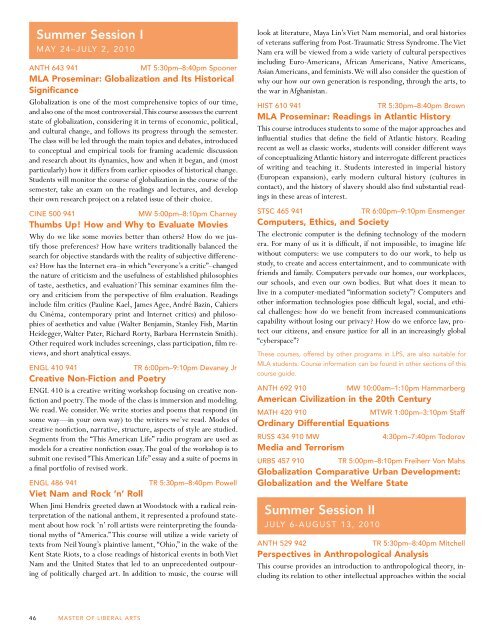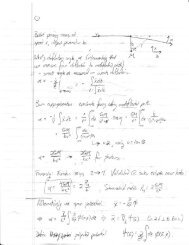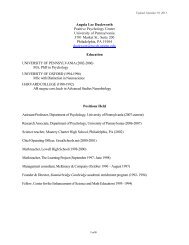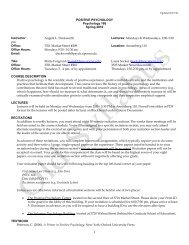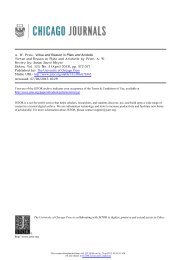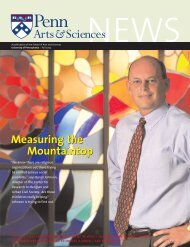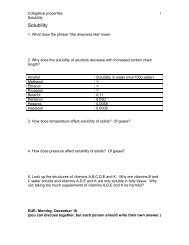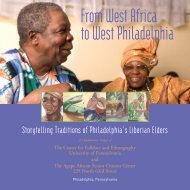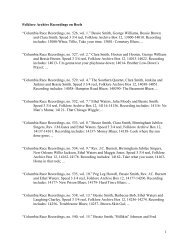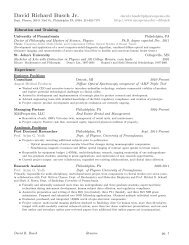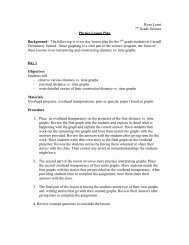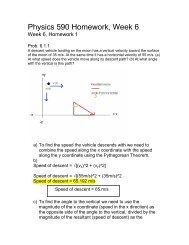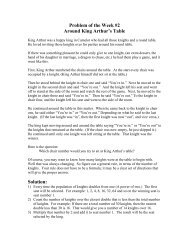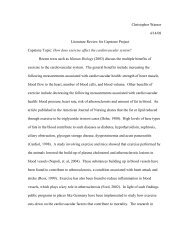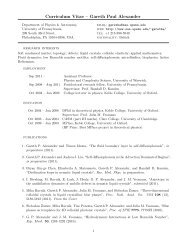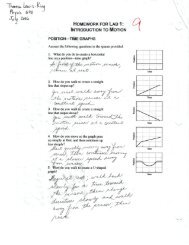PENN SUMMER - University of Pennsylvania
PENN SUMMER - University of Pennsylvania
PENN SUMMER - University of Pennsylvania
You also want an ePaper? Increase the reach of your titles
YUMPU automatically turns print PDFs into web optimized ePapers that Google loves.
Summer Session i<br />
MAY 24–JULY 2, 2010<br />
anTh 643 941 MT 5:30pm–8:40pm spooner<br />
MLA Proseminar: Globalization and Its Historical<br />
Significance<br />
Globalization is one <strong>of</strong> the most comprehensive topics <strong>of</strong> our time,<br />
and also one <strong>of</strong> the most controversial. This course assesses the current<br />
state <strong>of</strong> globalization, considering it in terms <strong>of</strong> economic, political,<br />
and cultural change, and follows its progress through the semester.<br />
The class will be led through the main topics and debates, introduced<br />
to conceptual and empirical tools for framing academic discussion<br />
and research about its dynamics, how and when it began, and (most<br />
particularly) how it differs from earlier episodes <strong>of</strong> historical change.<br />
Students will monitor the course <strong>of</strong> globalization in the course <strong>of</strong> the<br />
semester, take an exam on the readings and lectures, and develop<br />
their own research project on a related issue <strong>of</strong> their choice.<br />
CIne 500 941 MW 5:00pm–8:10pm Charney<br />
Thumbs Up! How and Why to Evaluate Movies<br />
Why do we like some movies better than others? How do we justify<br />
those preferences? How have writers traditionally balanced the<br />
search for objective standards with the reality <strong>of</strong> subjective differences?<br />
How has the Internet era–in which “everyone’s a critic”–changed<br />
the nature <strong>of</strong> criticism and the usefulness <strong>of</strong> established philosophies<br />
<strong>of</strong> taste, aesthetics, and evaluation? This seminar examines film theory<br />
and criticism from the perspective <strong>of</strong> film evaluation. Readings<br />
include film critics (Pauline Kael, James Agee, André Bazin, Cahiers<br />
du Cinéma, contemporary print and Internet critics) and philosophies<br />
<strong>of</strong> aesthetics and value (Walter Benjamin, Stanley Fish, Martin<br />
Heidegger, Walter Pater, Richard Rorty, Barbara Herrnstein Smith).<br />
Other required work includes screenings, class participation, film reviews,<br />
and short analytical essays.<br />
engl 410 941 Tr 6:00pm–9:10pm devaney Jr<br />
Creative Non-Fiction and Poetry<br />
ENGL 410 is a creative writing workshop focusing on creative nonfiction<br />
and poetry. The mode <strong>of</strong> the class is immersion and modeling.<br />
We read. We consider. We write stories and poems that respond (in<br />
some way—in your own way) to the writers we’ve read. Modes <strong>of</strong><br />
creative nonfiction, narrative, structure, aspects <strong>of</strong> style are studied.<br />
Segments from the “This American Life” radio program are used as<br />
models for a creative nonfiction essay. The goal <strong>of</strong> the workshop is to<br />
submit one revised “This American Life” essay and a suite <strong>of</strong> poems in<br />
a final portfolio <strong>of</strong> revised work.<br />
engl 486 941 Tr 5:30pm–8:40pm Powell<br />
Viet Nam and Rock ’n’ Roll<br />
When Jimi Hendrix greeted dawn at Woodstock with a radical reinterpretation<br />
<strong>of</strong> the national anthem, it represented a pr<strong>of</strong>ound statement<br />
about how rock ’n’ roll artists were reinterpreting the foundational<br />
myths <strong>of</strong> “America.” This course will utilize a wide variety <strong>of</strong><br />
texts from Neil Young’s plaintive lament, “Ohio,” in the wake <strong>of</strong> the<br />
Kent State Riots, to a close readings <strong>of</strong> historical events in both Viet<br />
Nam and the United States that led to an unprecedented outpouring<br />
<strong>of</strong> politically charged art. In addition to music, the course will<br />
46 MAsTer oF LiberAL ArTs<br />
look at literature, Maya Lin’s Viet Nam memorial, and oral histories<br />
<strong>of</strong> veterans suffering from Post-Traumatic Stress Syndrome. The Viet<br />
Nam era will be viewed from a wide variety <strong>of</strong> cultural perspectives<br />
including Euro-Americans, African Americans, Native Americans,<br />
Asian Americans, and feminists. We will also consider the question <strong>of</strong><br />
why our how our own generation is responding, through the arts, to<br />
the war in Afghanistan.<br />
hIsT 610 941 Tr 5:30pm–8:40pm Brown<br />
MLA Proseminar: Readings in Atlantic History<br />
This course introduces students to some <strong>of</strong> the major approaches and<br />
influential studies that define the field <strong>of</strong> Atlantic history. Reading<br />
recent as well as classic works, students will consider different ways<br />
<strong>of</strong> conceptualizing Atlantic history and interrogate different practices<br />
<strong>of</strong> writing and teaching it. Students interested in imperial history<br />
(European expansion), early modern cultural history (cultures in<br />
contact), and the history <strong>of</strong> slavery should also find substantial readings<br />
in these areas <strong>of</strong> interest.<br />
sTsC 465 941 Tr 6:00pm–9:10pm ensmenger<br />
Computers, Ethics, and Society<br />
The electronic computer is the defining technology <strong>of</strong> the modern<br />
era. For many <strong>of</strong> us it is difficult, if not impossible, to imagine life<br />
without computers: we use computers to do our work, to help us<br />
study, to create and access entertainment, and to communicate with<br />
friends and family. Computers pervade our homes, our workplaces,<br />
our schools, and even our own bodies. But what does it mean to<br />
live in a computer-mediated “information society”? Computers and<br />
other information technologies pose difficult legal, social, and ethical<br />
challenges: how do we benefit from increased communications<br />
capability without losing our privacy? How do we enforce law, protect<br />
our citizens, and ensure justice for all in an increasingly global<br />
“cyberspace”?<br />
These courses, <strong>of</strong>fered by other programs in LPS, are also suitable for<br />
MLA students. Course information can be found in other sections <strong>of</strong> this<br />
course guide.<br />
anTh 692 910 MW 10:00am–1:10pm hammarberg<br />
American Civilization in the 20th Century<br />
MaTh 420 910 MTWr 1:00pm–3:10pm staff<br />
Ordinary Differential Equations<br />
russ 434 910 MW 4:30pm–7:40pm Todorov<br />
Media and Terrorism<br />
urBs 457 910 Tr 5:00pm–8:10pm Freiherr Von Mahs<br />
Globalization Comparative Urban Development:<br />
Globalization and the Welfare State<br />
Summer Session ii<br />
JULY 6-AUgUST 13, 2010<br />
anTh 529 942 Tr 5:30pm–8:40pm Mitchell<br />
Perspectives in Anthropological Analysis<br />
This course provides an introduction to anthropological theory, including<br />
its relation to other intellectual approaches within the social


